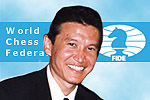|
Approved by the 1998 General Assembly. |
| 1. |
Handling of unplayed games
To avoid improper influence of unplayed games on the ranking
these games shall be counted as follows :
Independently of the result of an unplayed game (win by Bye,
win or loss by forfeit, no game because the player has withdrawn or was absent
for some round(s)) for reasons of tiebreak, the result shall be counted as a
Draw against the player himself.
This will have no influence on the Sum of Progressive Score or
Koya System. In these Systems only the result counts. |
| 2. |
List of commonly used Tiebreak Rules
In all Systems the players shall be ranked in descending order
of the respective Tiebreak System. Within the following list there is no
intention expressing an order of priority. |
| 2.1 |
Tiebreak Rules using the Player's own results
|
| 2.1.1 |
Sum of Progressive Scores
after each round a player has a certain tournament score. These
scores are added to the total Sum of Progressive Scores. |
| 2.1.1.1 |
Sum of Progressive Score Cuts
is the Sum of Progressive Scores reduced by the tournament
score of one or more rounds, starting with the first round. |
| 2.1.2 |
Matchpoints in Team Competitions
2 points for a won match (a team has scores more points than
half the number of boards a team should have)
1 point for a drawn match (a team has scored the same number as
the number of boards a team should have)
0 points for a lost match (a team has scored less points than
half the number of boards a team should have). |
| 2.1.3 |
The Koya System for Round Robin Tournaments
This is the number of points achieved against all opponents who
have achieved 50 % or more. |
| 2.1.3.1 |
The Koya System extended
The Koya System may be extended step by step to include score
groups with less than 50 % |
| 2.1.4 |
Direct Encounter
If all tied players have met each other, the sum of points from
these encounters will decide. |
| 2.1.5 |
Number of games won |
| 2.2 |
Tiebreak Rules using the Results of Opponents
|
| 2.2.1 |
The Buchholz System |
| 2.2.1.1 |
The Buchholz Score is the sum of the score of each of the
opponents of a player |
| 2.2.1.2 |
The Median Buchholz 1
is the Buchholz Score reduced by the highest and the lowest
score of the opponents. |
| 2.2.1.3 |
The Median Buchholz 2
is the Buchholz Score reduced by the two highest and the two
lowest scores of the opponents |
| 2.2.1.4 |
The Buchholz Cut 1
is the Buchholz Score reduced by the lowest score of the
opponents |
| 2.2.1.5 |
The Buchholz Cut 2
is the Buchholz Score reduced by the two lowest scores of the
opponents |
| 2.2.1.6 |
The Sum of Buchholz is the sum of the Buchholz Scores of the
opponents |
| 2.2.2 |
The Sonneborn-Berger System |
| 2.2.2.1 |
Sonneborn-Berger for Individual Tournaments
is the sum of the opponents a player has defeated and half the
scores of the players he has drawn with. |
| 2.2.2.2 |
Sonneborn-Berger for Team Tournaments 1
is the sum of the scores of the opponents teams, each
multiplied by the scores achieved against this opponent team |
| 2.3 |
Tiebreak Rules using Ratings |
| 2.3.1 |
The Average Rating of Opponents
is the sum of the ratings of the opponents of a player divided
by the number of rounds. |
| 2.3.1.1 |
The average Rating Cuts
is the Average Rating of Opponents reduced by one or more of
the ratings of the opponents, started from the lowest rated opponent.
|
| 2.3.2 |
Tournament Performance Ratings (including the 350 points rule)
|
| 3. |
Application of Tiebreak System to different Tournament systems
The choice of the Tiebreak System to be used in a tournament
shall be decided in advance taking into account the type of the tournament
(Swiss, Round Robin, Teams, etc.) and the special structure of players to be
expected in the tournament. For instance the applicaton of Tiebreak rules using
the ratings of players is dubious in tournaments where the ratings are not
available or not consistent or not necessarely correct (e.g. Junior/Senior
tournaments)
Only one type of the three categories described above should be
used for a given event.
For example : a) Sum of Progressive Score + b) Buchholz would
be incorrect.
For different types of tournaments the Tiebreak Rules are
recommended as listed below :
Individual Round Robin Tournaments:
- direct encounter
- Koya System
- Sonneborn-Berger
- Number of won games
Team Round Robin System:
- Games points
- Match points
- Direct encounter
- Sonneborn-Berger
Individual Swiss Systems (all players have consistent ratings):
- Average rating of opponents
- Tournament Performance Rating
Individual Swiss Systems (most players are mostly rated,
ratings are not consistent):
- Direct encounter
- Sum of progressive scores
- Buchholz
- Sonneborn-Berger
- Won games
Individual Swiss Systems (most players are not rated):
- Direct encounter
- Buchholz
- Sonneborn-Berger
- Won games
Team Swiss Systems :
- Games points
- Match points
- Direct encounter
- Buchholz
- Sonneborn-Berger
|


